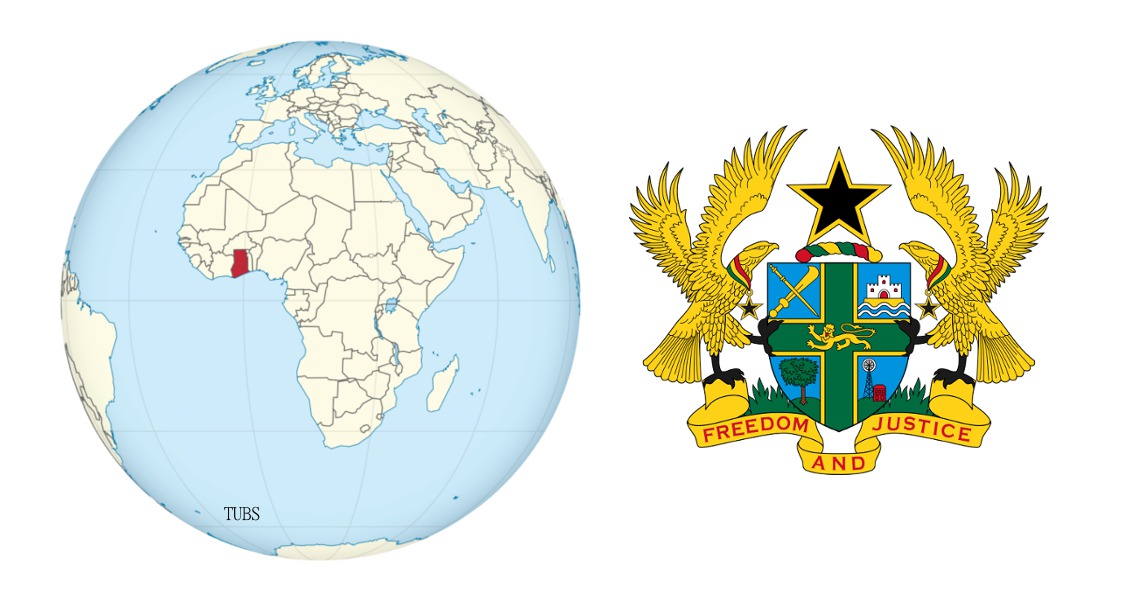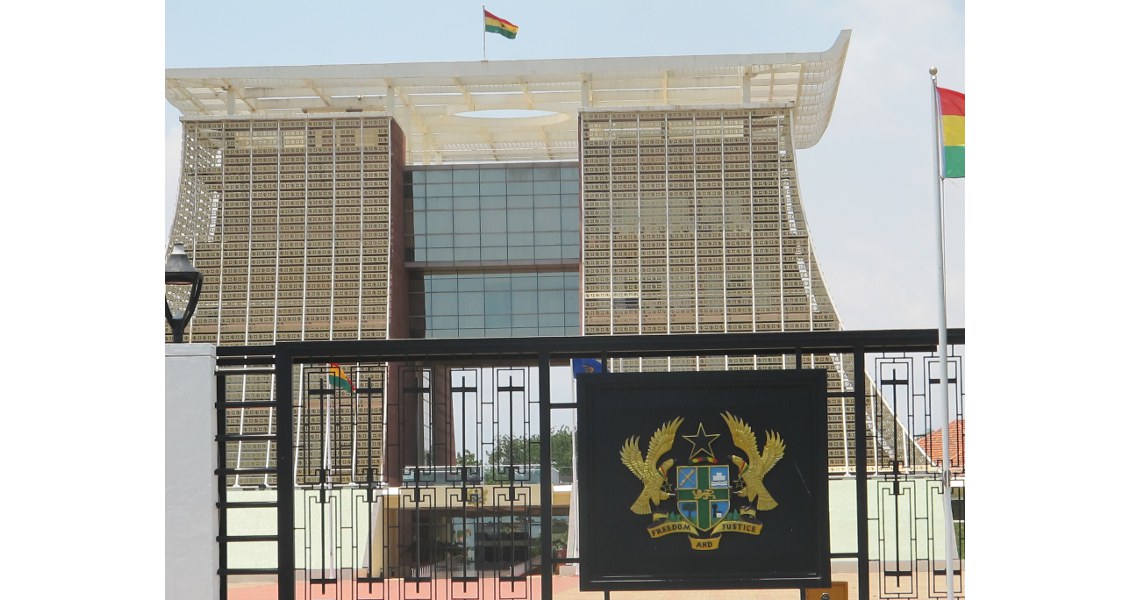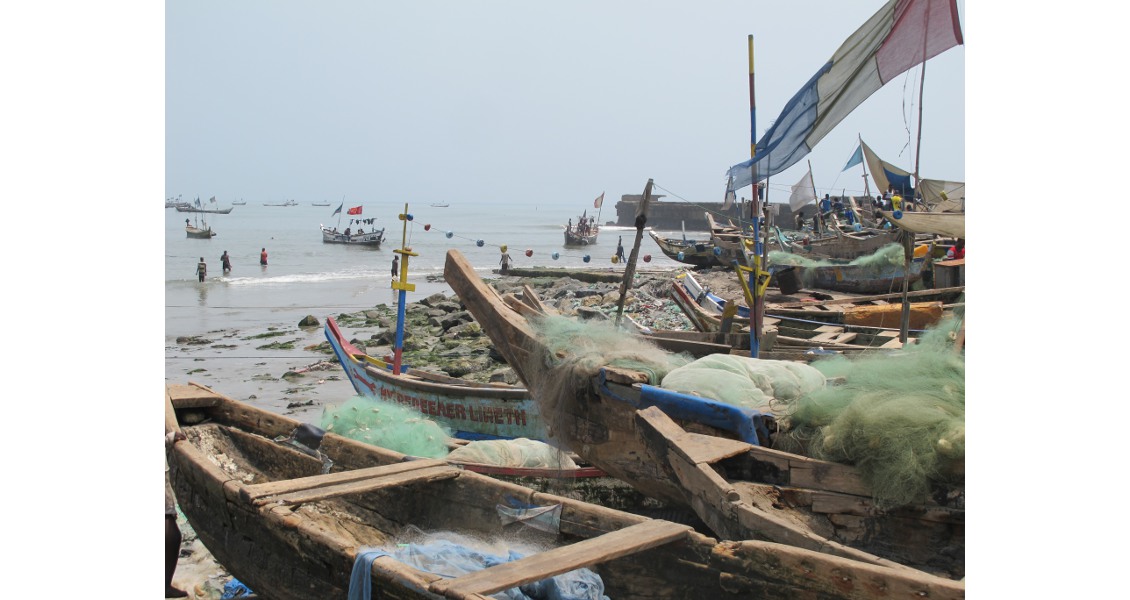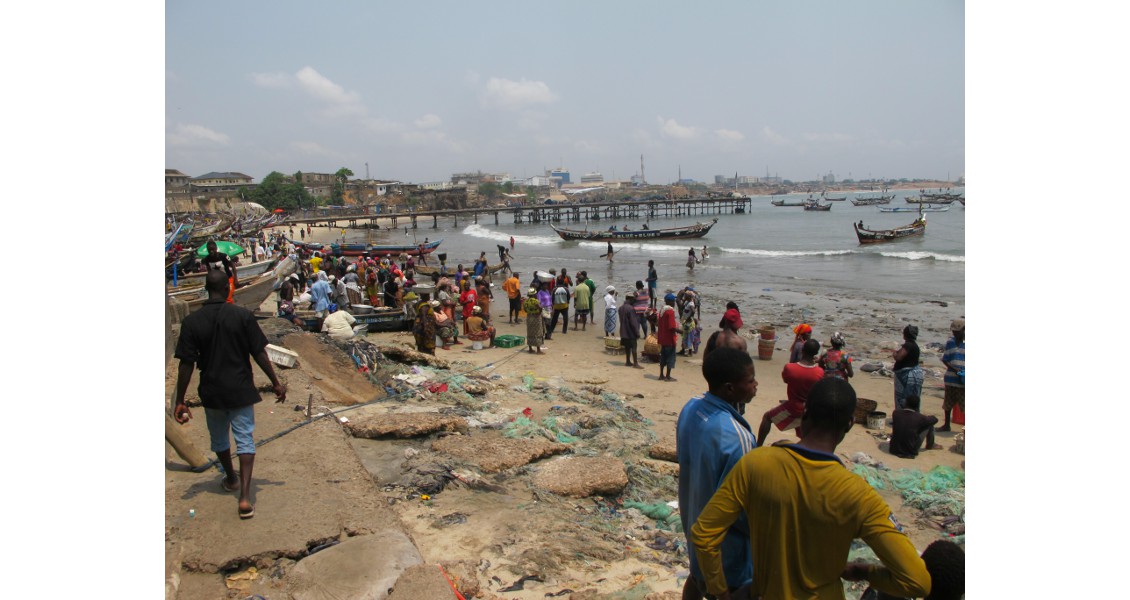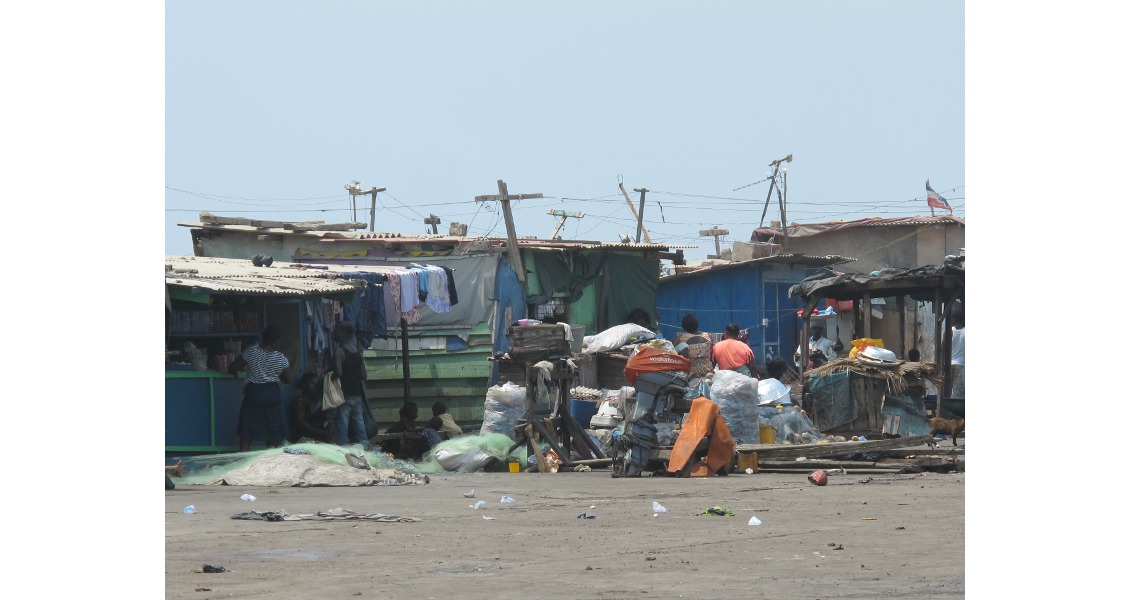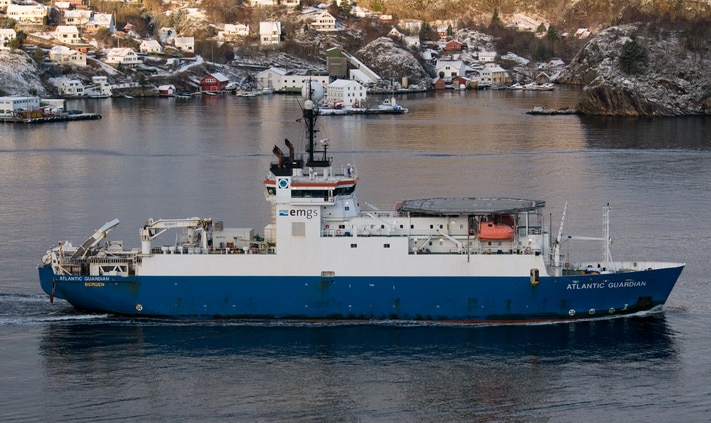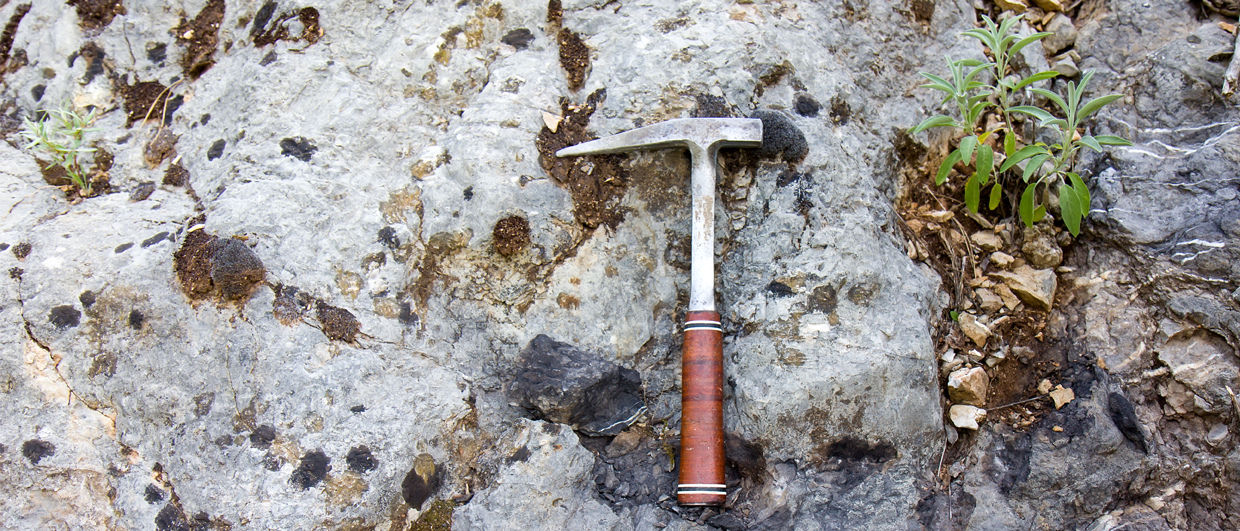In 2007 Kosmos Energy discovered the 1.2 Bbo deepwater Jubilee field off Ghana’s coast. First oil was achieved in a remarkable three and a half years and since 2009, further discoveries of commercially viable gas, gas condensate and oil have been made in two other blocks. Production is expected to reach 190,000 bopd by 2016, plus another 80,000 boepd by 2019.
Ghana is, of course, accustomed to living on commodity wealth: gold is still its major revenue source, and the country is the second largest cocoa producer in the world. Despite this wealth, Ghana remains 138th on the Human Development Index, with more than 30% of its population living on less than $1.25 a day.
The discovery of oil inevitably prompted a huge, popular wave of optimism. Hopes were high that the government would be able to deliver more basic services – including energy – to its 26 million population, and move towards industrialisation, the ‘holy grail’ of every developing country.
Booming Economy
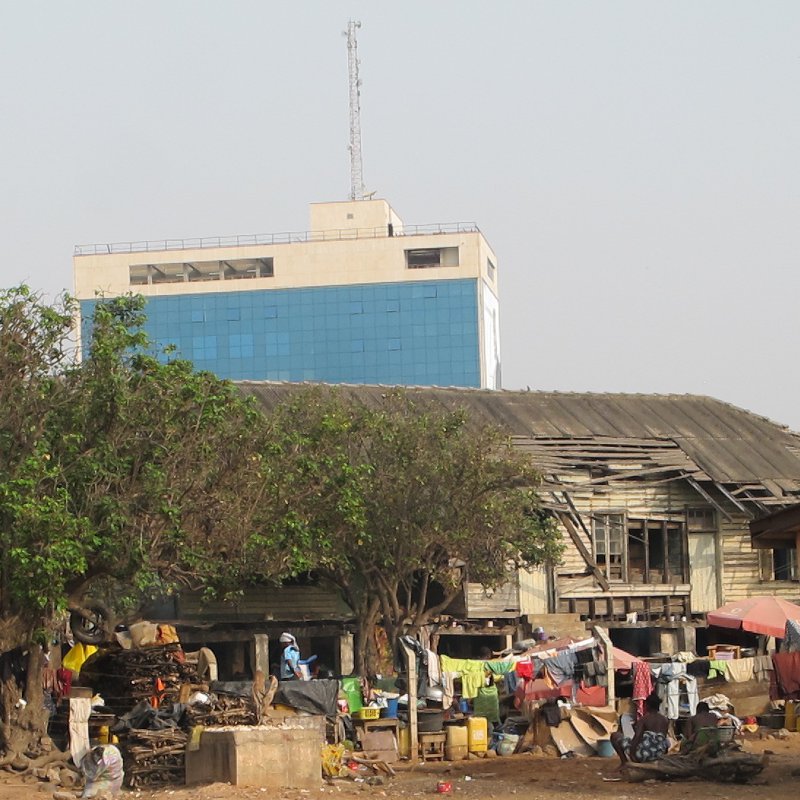 The glass walls of the Bank of Ghana building rise up above a slum in Accra. (Source: Nikki Jones)The big fear was the ‘resource curse’ – the seemingly inevitable fanning of corruption, conflict and increased poverty from an oil-fuelled exchange rate. However, hopes were high for Ghana, one of the continent’s foremost ‘rising democratic stars’. Since the early 1990s, politics have been stable and since 2001, elections have delivered relatively peaceful changes of government. Indeed, the government itself appeared to embrace the clamour of demands for transparency, accountability and public consultation. There was an immediate flurry of legislative activity, including a Revenue Management Act, a local content framework, and the establishment of two, key regulatory bodies. As early as 2010, Ghana was recognised as EITI (Extractive Industries Transparency Initiative) compliant.
The glass walls of the Bank of Ghana building rise up above a slum in Accra. (Source: Nikki Jones)The big fear was the ‘resource curse’ – the seemingly inevitable fanning of corruption, conflict and increased poverty from an oil-fuelled exchange rate. However, hopes were high for Ghana, one of the continent’s foremost ‘rising democratic stars’. Since the early 1990s, politics have been stable and since 2001, elections have delivered relatively peaceful changes of government. Indeed, the government itself appeared to embrace the clamour of demands for transparency, accountability and public consultation. There was an immediate flurry of legislative activity, including a Revenue Management Act, a local content framework, and the establishment of two, key regulatory bodies. As early as 2010, Ghana was recognised as EITI (Extractive Industries Transparency Initiative) compliant.
Gold and cocoa prices were already rising, and oil helped push GDP growth as high as 25% in 2012. Infrastructure projects were launched across the country and Ghana set about meeting its 2015 poverty reduction target. It seemed that it might just fulfil President Kufuor’s dream of becoming an ‘African tiger’ and in 2010, the country was upgraded to Lower Middle Income Country status, ranking it alongside India, Indonesia and Ukraine.
Down on the ground, however, some of the realities were less encouraging. Accra suddenly became a boom town for prestige apartments and government department buildings – epitomised by the president’s $40–50 million golden palace and the magnificent Petroleum Commission headquarters. Roads became clogged with SUVs, young people flocked to the cities, rents in strategic areas began to rocket and land-grabs (where no formal deeds were held) became commonplace. The reality for the majority remained subsistence-level, insecure petty trading with limited public services.
No Transparency in Block Allocation
Clearly, many of the worst features of the resource curse have arrived. Most worryingly, 17 of Ghana’s off-shore blocks have now been licensed, but none by competitive tender. Several scandals have already emerged, almost all involving the granting of licences to small, unknown Ghanaian companies where the ‘beneficial ownership’ is hidden. Many are high value blocks close to the Jubilee field. In theory, all Petroleum Agreements are ratified by parliament but in several cases they have been introduced to parliament under ‘certificates of urgency’, with two ‘approved’ in less than six hours. According to the Africa Centre for Energy Policy (ACEP), the rush has been explicitly to get licences through before the long-awaited Exploration and Production Bill is passed.
A Petroleum Commission able to negotiate contracts was established in 2011 but its powers and its independence are weak. The national oil company, GNPC, was supposed to be removed from all contract negotiations, so that the NOC stopped being both referee and player, but in practice this has not happened. GNPC is still involved in the negotiation and reviewing of all petroleum agreements and although Ghana has belatedly published some of these contracts, publication is still not mandatory.
The suspicion is, of course, that certain members of the political elite are behind these unknown Ghanaian companies, and that under the guise of ‘local content’, they are either getting privileged access to high value blocks from which they hope to make fortunes, or they are operating simply as ‘front’ companies ‘greasing the wheels’ on behalf of larger IOCs.
Most cases are below the public radar but in 2014 one local company overstepped the mark. The unknown Ghanaian company Miura Petroleum International, only founded in 2013, was in exclusive negotiations with the Ministry and so confident of getting its contract for a block just 30 km from Jubilee that it forged the signature of the Minister for Energy and attempted to sell its stake to Canadian listed Gondwana Oil Corp. This only became public when Gondwana then went to the stock exchange to raise funds for its exploratory work.
As part of the initial flurry of protective legislation, a Right to Information Bill was first drafted in 2007 but it has still not been passed into law.
Revenue Management
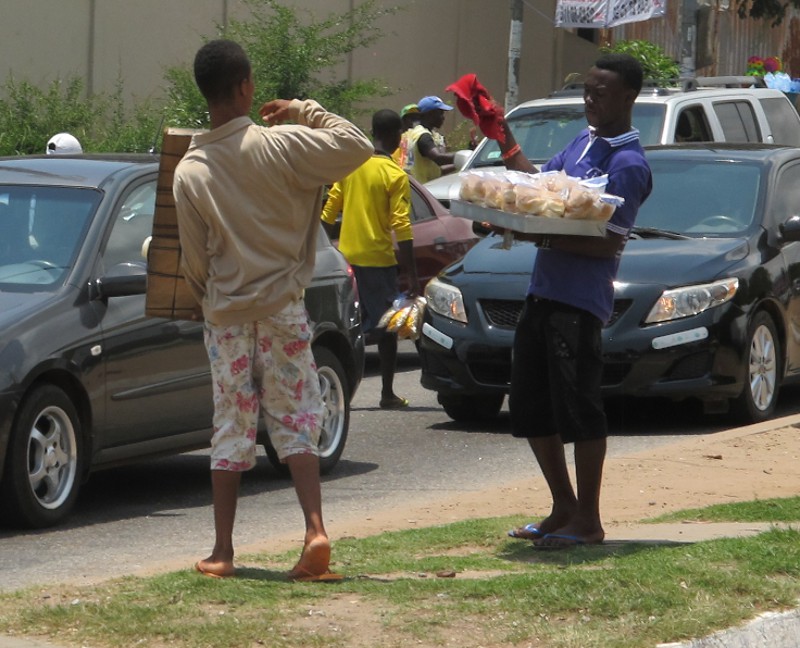 Street vendors, selling everything from food to household goods, are a common sight in Ghana. (Source: NIkki Jones)Similarly, it has been a battle to remove the Minister of Finance’s power to withhold information on oil revenues. A Revenue Management Act, finally enacted a year after first oil, has brought some transparency. Revenues are now paid into a single fund before they are divided, roughly 50-50, between the government’s budget and GNPC. Funds are then distributed into four agreed areas of national development, and two sovereign wealth funds.
Street vendors, selling everything from food to household goods, are a common sight in Ghana. (Source: NIkki Jones)Similarly, it has been a battle to remove the Minister of Finance’s power to withhold information on oil revenues. A Revenue Management Act, finally enacted a year after first oil, has brought some transparency. Revenues are now paid into a single fund before they are divided, roughly 50-50, between the government’s budget and GNPC. Funds are then distributed into four agreed areas of national development, and two sovereign wealth funds.
Although the legislation is clear, and parliament is supposed to have oversight of all expenditure, Ghana’s government, Auditor General, the Bank of Ghana and Ghana’s Revenue Authority have all failed on key reporting and publishing requirements. The management of the sovereign wealth funds is beyond scrutiny and a particular cause for concern. There has been a reported 65 million Cedi (about US$20 million) allocation to the Office of the President – more than the allocation to agriculture. The amount claimed by the GNPC for production and administration costs is beyond scrutiny.
Regional and International Concerns
The ‘resource curse’ recognises that oil is not only a fuel for corruption, but can often bring regional conflict. There has been a noticeable increase in tension along the coastal strip where the UK’s development agency has calculated that, because of oil, 60% of the 40,000 fishermen and 90,000 farmers in the region will have lost their jobs by 2020.
The northern regions, where two thirds live below the poverty line, are also a recognised ‘hot-spot’. Inter-ethnic violence occurs on a recognisable ten-year cycle and although many have been lifted out of absolute poverty in the south, there has been an increase in the north. Agriculture, which employs 55% of the country, is a recognised priority, but the small percentage it receives is spread too thinly to make a difference.
In Accra, there have been demonstrations against power cuts and in June, the destruction of a slum, home to an estimated 50,000 mainly northern migrants, brought angry demonstrations, with some slum dwellers holding signs predicting the imminent arrival of Boko Haram. The clearance has left the 50,000 homeless, and the demonstrations were met by police using tear gas. It seems the oil-fuelled rush to modernise may be generating serious longer-term problems.
A further concern is a potential conflict with its neighbour, Ivory Coast. Like many African countries, Ghana has the artificial boundaries left from colonial days, including a thin finger of coast below its neighbour’s territory which enabled Ghana to claim an extended, valuable offshore acreage. Last March, both countries took their dispute to the International Tribunal for the Law of the Sea, which ruled that although work on the TEN field (Tweneboa-Enyenra-Ntomme) could continue, there should be no further exploration in the area. Outright hostilities seem unlikely but the two-year wait for a legal ruling will severely disrupt Ghana’s oil exploration.
The Biggest Threat – Debt
In 2014, debt brought Ghana down from the giddy heights of being one of Africa’s shining stars to requesting an IMF bail-out, despite the fact that only as recently as 2004 Ghana had most of its external debt written off in the World Bank’s Heavily Indebted Poor Country (HIPC) initiative. The Revenue Management Act allows the government to use 70% of oil revenues as collateral, and it appears to have taken full advantage.
By 2015, debt had climbed to 60% of GDP as successive governments have run large budget deficits. Foreign investors had rushed to provide loans while interest rates were so attractive. The confidence of the government was so high, that in 2007 Ghana became the first sub-Saharan country to issue a bond in US dollars. Now, as investors pull out, the Cedi has fallen. In 2014 it lost almost 40% of its value – the world’s worst performing currency – and it has fallen a further 25% this year. This has been exacerbated by the drop in gold prices that began in 2013, and the drop in oil prices is estimated to have added a further 2% to the budget deficit.
Ghana has also been hit by the rising dollar. Not only are most of its imports – particularly food – purchased in dollars, bringing inflation to 17% in 2014, but its dollar-denominated bonds have had to be serviced.
The result is a billion dollar loan from the IMF, conditional upon measures that include a new 17% petroleum tax (for domestic consumers) and a freeze on public sector employment. For ordinary people who have seen no benefit from oil production, the currency crisis is a national disaster.
Food and Energy Imports
This is particularly true because, despite its agricultural base and its oil wealth, Ghana is increasingly dependent on imported food and energy. Agriculture still employs 55% of the population and contributes 40% of GDP, but both domestic food production and cocoa, Ghana’s lucrative export, have struggled for investment.
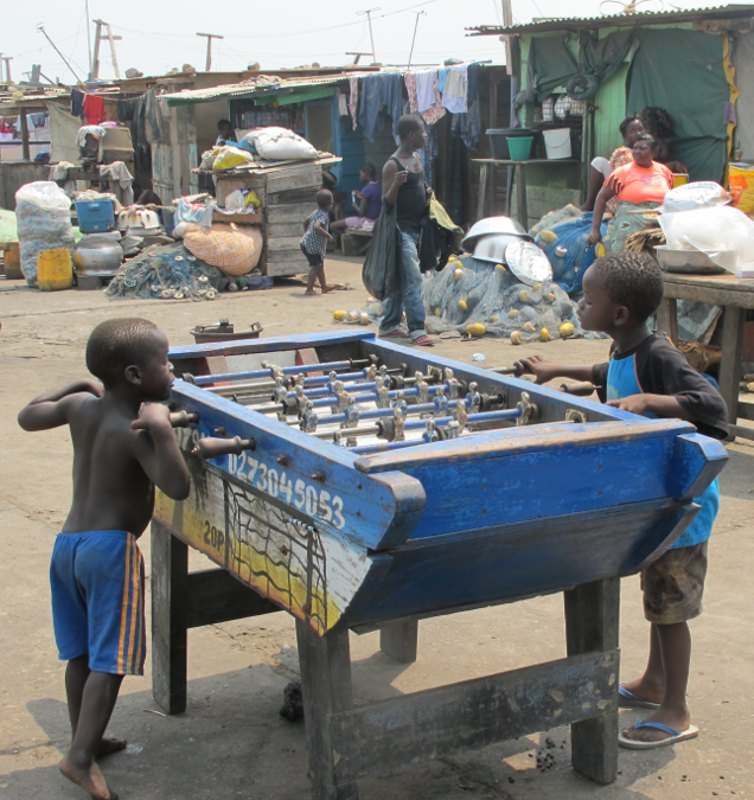 Boys enjoy a game of table football in Accra. (Source: Nikki Jones)Energy is Ghana’s other big import bill. Currently, 65% of Ghanaians have access to electricity but over the last few years, supply has become increasingly intermittent. President Mahama is popularly known as Mr Dumsor, Mr Off-On. The unpredictability has meant that many industries and wealthier homes have come to rely on diesel generators, which adds to the country’s import bill.
Boys enjoy a game of table football in Accra. (Source: Nikki Jones)Energy is Ghana’s other big import bill. Currently, 65% of Ghanaians have access to electricity but over the last few years, supply has become increasingly intermittent. President Mahama is popularly known as Mr Dumsor, Mr Off-On. The unpredictability has meant that many industries and wealthier homes have come to rely on diesel generators, which adds to the country’s import bill.
The government’s aim is to generate 5,000 MW by 2016, firstly by importing gas from Nigeria through the offshore West Africa Gas Pipeline; secondly, using its own gas; and thirdly – a more recent development – importing LNG. Delays in the first two projects have resulted in enormous costs for the country. Two thermal plants have been run on imported light crude, costing $3m a day, and free gas from the Jubilee field has not only not been used, but has been re-injected, reducing oil output. This gas finally came onstream at the end of 2014.
Although some of the delays have been outside Ghana’s control, it is clear that corruption and mismanagement have also been factors. Without open tendering, Sinopec was given the contract to build both the pipeline from Jubilee and the gas processing plant that Ghana is dependent upon. The deal was withheld from parliament and repeated delays have, according to the Africa Centre for Energy Policy, cost the country an estimated $2.2bn since 2011.
Managing Expectations
Ever since oil was discovered, the mantra of government has been the ‘management of people’s expectations’. This has always seemed unjust given that the majority are still waiting to feel the benefits of more than a century’s concerted mineral exploitation. It seems that Ghana’s government is fulfilling the world’s worst fears: it has not managed its own expectations.

